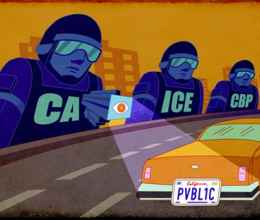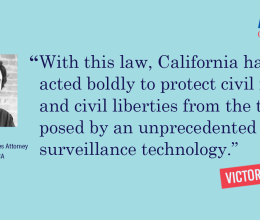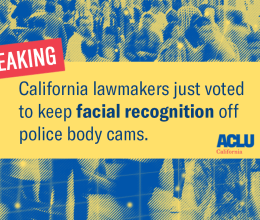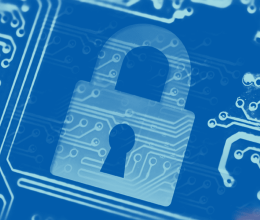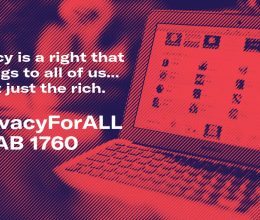BACKGROUND
The ACLU of San Diego & Imperial Counties filed a class action suit in district court on July 24, 2000 challenging San Diego County’s "Project 100%," launched in 1997.
In June 2000, Rocio Sanchez separated from her husband and applied for public assistance. As she was moving into a new apartment, a fraud investigator appeared at her back door, asking about her husband, where he lived, why they separated. He searched the house and questioned her about a man's shirt and shoes he found in the closet that belonged to her brother. Sanchez felt this wasn't right, and became the named plaintiff in the suit.
Project 100% is a program run by San Diego County’s District Attorney’s Office in partnership with the County’s Health and Human Services Agency. Virtually everyone in San Diego County who applies for CalWORKs—California’s public assistance program that provides cash aid and services to eligible families—must consent to a “home visit” by a Public Assistance Investigator before cash benefits can be issued. San Diego County is the only county in the nation with such a program.
Home visits only occur if the application contains no signs of fraud or inconsistent information. If actual fraud is suspected, the applicant is subjected to other anti-fraud measures, and P100 does not apply.
The ACLU of San Diego & Imperial Counties has long-standing and current concerns about P100. The most basic concern is that the program forces people to open their homes to the District Attorney’s office for the sole reason that they are applying for benefits. The ACLU is always concerned about people’s right to privacy, and we don't think people who are entitled to government assistance should be required to sacrifice this right.
The home “walk-throughs” are particularly intrusive and arbitrary. People can and have been denied benefits for a number of inappropriate reasons, including when agents discovered an extra toothbrush, boxer shorts, extra-large t-shirts, or boots. Investigators assumed, in error, that these things indicated that the applicant had failed to report the wages of a hidden wage-earner who lived with the family. Domestic violence survivors have been denied benefits when investigators said they didn’t have enough belongings to prove they lived in the home, even though they had recently fled there to avoid violence.
People who have been through the searches and questioning allege that the investigators used coercion and misinformation to persuade applicants to withdraw their applications for benefits to which they are entitled.
LITIGATION
The ACLU of San Diego & Imperial Counties sued the county in 2000, claiming the sweeping and suspicionless searches into the homes of welfare applicants violated the privacy rights of aid applicants merely because they’re poor. We also argued that the project contravenes federal and state statutory and regulatory provisions which govern the scope and the manner in which defendants are permitted to verify information concerning applicants for welfare benefits and food stamps.
The case went to the highest appeals court in California, but unfortunately survived the legal challenge based on a bizarre ruling that the “home visits” are not searches and are voluntary. However, applicants who don’t agree to the searches are disqualified from eligibility. A judge writing for the minority said that upholding Project 100% “strikes an unprecedented blow at the core of Fourth Amendment protections,” and called the case “an assault on the poor.”
The San Diego ACLU is continuing to investigate P100 to see if the project should be challenged again in the courts.
CO-COUNSEL
Co-counsel in this legal case include the Western Center on Law and Poverty, San Diego Volunteer Lawyer Program, and the law firm of Milberg Weiss Bershad Hynes & Lerach LLP (succeeded as counsel by Lerach Coughlin Stoia Geller Rudman and Robbins LLP).
CASE DEVELOPMENTS
- November 27, 2006: U.S. Supreme Court refuses to hear appeal in one line order.
- September 19, 2006: U.S. Court of Appeals, Ninth Circuit, holds that Project 100% does not violate the United States Constitution, the California Constitution, or California welfare regulations and affirm the district court.
- July 24, 2000: Filed in district court.
PERTINENT DOCUMENTS
- San Diego ACLU Fact Sheet, 2016
- Order denying en banc review by Judge Harry Pregerson; Dissent by Judge Alex Kozinski, April 16, 2007
- Final U.S. Supreme Court Petition, August 15, 2007
- Ninth Circuit Opinion by Judge A. Wallace Tashima; Dissent by Judge Raymond Fisher, September 19, 2006
MEDIA
- A Loss for Privacy Rights, New York Times lead editorial, November 28, 2007
Justices uphold checks of welfare residences, Los Angeles Times, November 27, 2007 - Supreme Court declines to review county's routine searches of welfare applicants' homes, Associated Press, November 26, 2007
- Full Constitutional Protections for Some, But No Privacy for the Poor, New York Times, legal analysis, July 16, 2007
- "The Word: Premium Package," The Colbert Report, July 23, 2007, August 28, 2014
- Court Rejects Constitutional Claims, Upholds Investigators’ Warrantless Visits to Homes of Welfare Applicants, Metropolitan News-Enterprise, Sept. 20, 2006
QUOTES
"This case is nothing less than an attack on the poor. This is especially atrocious in light of the fact that we do not require similar intrusions into the homes and lives of others who receive government entitlements. The government does not search through the closets and medicine cabinets of farmers receiving subsidies. Only the poor must give up their rights of privacy in exchange for essential public assistance."
- Judge Harry Pregerson, writing for seven dissenters.


